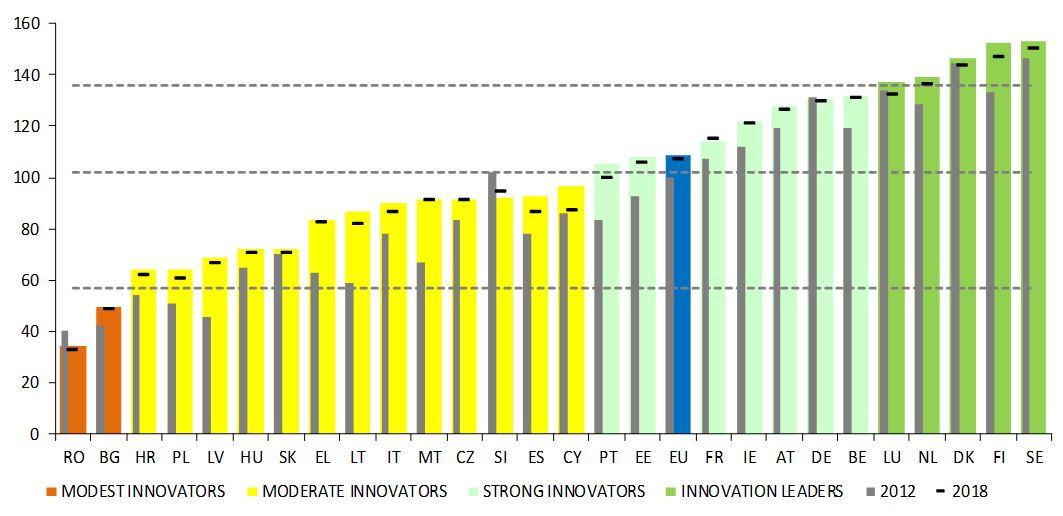News archive - European Innovation Scoreboard 2020: EU's innovation is increasing
The Commission released the European Innovation Scoreboard 2020, which shows that Europe's innovation performance continues to improve across the EU, surpassingfor the second year the United States. However, more needs to be done to catch up with global innovation leaders like South Korea, Australia and Japan. The results, which cover data from 2019, highlight the opportunities to better coordinate EU innovation policies, help Europe improve its global competitiveness and strengthen the key role innovation plays in overcoming the coronavirus pandemic.
Key findings
Within the EU, innovation performance continues to increase at a steady pace. Since a few years, the performance among Member States has been converging, a trend that is growing.
- This year's Scoreboard is marked by the withdrawal of the United Kingdom from the EU. This has had a small impact on the EU's average innovation performance, but has not affected the relative performance of Member States in relation to EU's global performance.
- Sweden continues to be the EU Innovation Leader, followed by Finland, Denmark and the Netherlands. This year Luxembourg (previously a Strong Innovator) joins the group of Innovation Leaders, while Portugal (previously a Moderate Innovator) joins the group of Strong Innovators.

European Innovation Scoreboard country ranking. Coloured columns show innovation performance in 2019, horizontal hyphens show performance in 2018, and grey columns show performance in 2012, all relative to the EU average in 2012.
- On average, the innovation performance of the EU has increased by 8.9% since 2012. Since 2012, innovation performance increased in 24 EU countries. Performance has increased the most in Lithuania, Malta, Latvia, Portugal and Greece.
- At the global level, the EU has for the second year surpassed the United States. The EU continues to have a performance lead over the United States, China, Brazil, Russia, South Africa, and India. Since 2012, the EU's performance gap with South Korea, Australia and Japan has increased, while the EU's performance lead over the United States, China, Brazil, Russia and South Africa has decreased. China has had the largest innovation performance growth rate amongst the EU's main competitors since 2012, growing at more than five times that of the EU
- In selected areas of innovation, the EU leaders are: Sweden– human resources; Luxembourg – attractive research systems; intellectual assets; Denmark – innovation-friendly environment; finance and support; Germany– firm investment; Portugal –innovation in small and medium-sized enterprises; Austria – linkages and collaboration; Ireland– employment impacts and sales impacts.
Background
The coronavirus pandemic has shaken the world in an unprecedented manner testing the resilience of our societies, economies, healthcare and welfare systems. The EU has done its utmost to use the tools at hand to protect lives whilst preserving the single market, and supporting Europe's economy. Research and innovation have proven to be an essential part of the coordinated EU response to the crisis and they will be vital to support Europe's sustainable and inclusive recovery. Measuring innovation performance is a key element in achieving this goal.
The European Innovation Scoreboard demonstrates the EU's and Member States commitment towards research and innovation. It also supports the development of policies to enhance innovation in Europe and inform policy makers in a rapidly changing evolving global context.
About two-thirds of Europe's economic growth over the last decades has been driven by innovation. Research and innovation boost the resilience of our production sectors, the competitiveness of our economies and the digital and ecological transformation of our societies. They also ensure preparedness for the future and are critical to deliver on the European Green Deal. Horizon Europe, the EU's research and innovation programme for the years 2021-27 with a proposed budget of € 94.4 billion, will help accelerate Europe's environmental and digital transformation, as also highlighted in the EU's new Industrial Strategy.
Original source: https://ec.europa.eu/commission/presscorner/detail/en/ip_20_1158
- European Union (EU 27)
- Cross-thematic/Interdisciplinary
Entry created by Admin WBC-RTI.info on June 23, 2020
Modified on June 23, 2020
